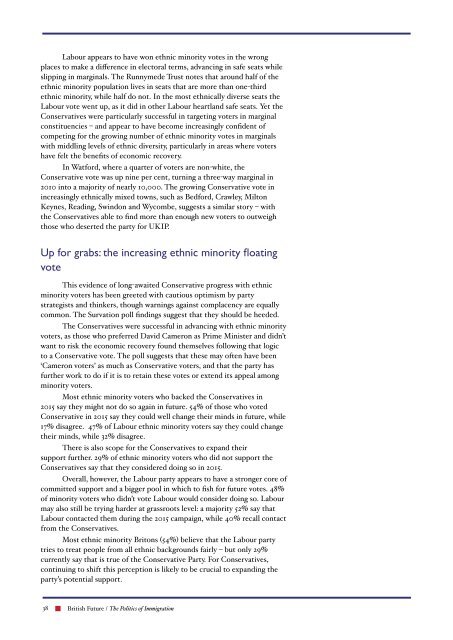THE POLITICS OF IMMIGRATION
The-politics-of-immigration
The-politics-of-immigration
You also want an ePaper? Increase the reach of your titles
YUMPU automatically turns print PDFs into web optimized ePapers that Google loves.
Labour appears to have won ethnic minority votes in the wrong<br />
places to make a difference in electoral terms, advancing in safe seats while<br />
slipping in marginals. The Runnymede Trust notes that around half of the<br />
ethnic minority population lives in seats that are more than one-third<br />
ethnic minority, while half do not. In the most ethnically diverse seats the<br />
Labour vote went up, as it did in other Labour heartland safe seats. Yet the<br />
Conservatives were particularly successful in targeting voters in marginal<br />
constituencies – and appear to have become increasingly confident of<br />
competing for the growing number of ethnic minority votes in marginals<br />
with middling levels of ethnic diversity, particularly in areas where voters<br />
have felt the benefits of economic recovery.<br />
In Watford, where a quarter of voters are non-white, the<br />
Conservative vote was up nine per cent, turning a three-way marginal in<br />
2010 into a majority of nearly 10,000. The growing Conservative vote in<br />
increasingly ethnically mixed towns, such as Bedford, Crawley, Milton<br />
Keynes, Reading, Swindon and Wycombe, suggests a similar story – with<br />
the Conservatives able to find more than enough new voters to outweigh<br />
those who deserted the party for UKIP.<br />
Up for grabs: the increasing ethnic minority floating<br />
vote<br />
This evidence of long-awaited Conservative progress with ethnic<br />
minority voters has been greeted with cautious optimism by party<br />
strategists and thinkers, though warnings against complacency are equally<br />
common. The Survation poll findings suggest that they should be heeded.<br />
The Conservatives were successful in advancing with ethnic minority<br />
voters, as those who preferred David Cameron as Prime Minister and didn’t<br />
want to risk the economic recovery found themselves following that logic<br />
to a Conservative vote. The poll suggests that these may often have been<br />
‘Cameron voters’ as much as Conservative voters, and that the party has<br />
further work to do if it is to retain these votes or extend its appeal among<br />
minority voters.<br />
Most ethnic minority voters who backed the Conservatives in<br />
2015 say they might not do so again in future. 54% of those who voted<br />
Conservative in 2015 say they could well change their minds in future, while<br />
17% disagree. 47% of Labour ethnic minority voters say they could change<br />
their minds, while 32% disagree.<br />
There is also scope for the Conservatives to expand their<br />
support further. 29% of ethnic minority voters who did not support the<br />
Conservatives say that they considered doing so in 2015.<br />
Overall, however, the Labour party appears to have a stronger core of<br />
committed support and a bigger pool in which to fish for future votes. 48%<br />
of minority voters who didn’t vote Labour would consider doing so. Labour<br />
may also still be trying harder at grassroots level: a majority 52% say that<br />
Labour contacted them during the 2015 campaign, while 40% recall contact<br />
from the Conservatives.<br />
Most ethnic minority Britons (54%) believe that the Labour party<br />
tries to treat people from all ethnic backgrounds fairly – but only 29%<br />
currently say that is true of the Conservative Party. For Conservatives,<br />
continuing to shift this perception is likely to be crucial to expanding the<br />
party’s potential support.<br />
38 British Future / The Politics of Immigration


